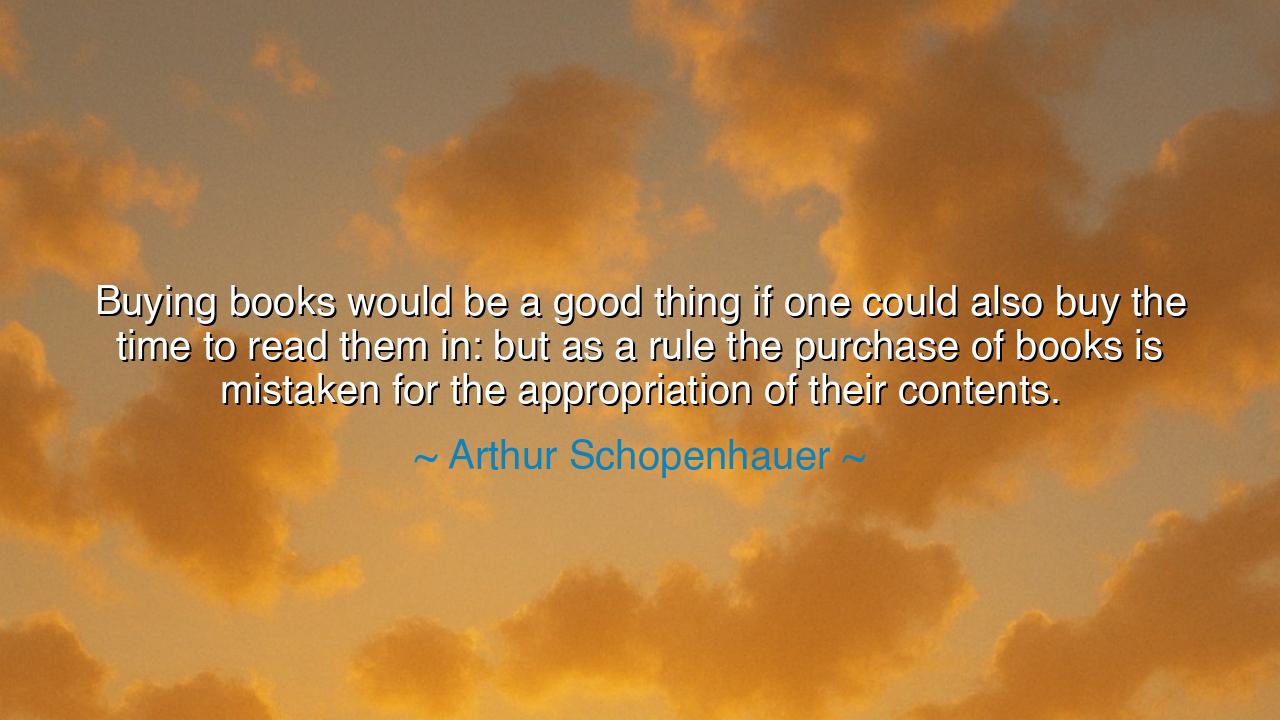
Buying books would be a good thing if one could also buy the
Buying books would be a good thing if one could also buy the time to read them in: but as a rule the purchase of books is mistaken for the appropriation of their contents.






Hear, O lovers of wisdom and seekers of knowledge, the stern yet luminous words of Arthur Schopenhauer: “Buying books would be a good thing if one could also buy the time to read them in: but as a rule the purchase of books is mistaken for the appropriation of their contents.” With this, the philosopher lays bare a folly as ancient as learning itself—the illusion that the possession of wisdom is the same as the practice of it, that owning the vessel of truth is equal to drinking deeply from its waters.
The book has always been a symbol of knowledge, a treasure of civilizations. Men and women in every age have pursued it with zeal, hoarding scrolls, manuscripts, and volumes as though their presence alone bestowed enlightenment. Yet Schopenhauer reminds us that the mere possession of books is vanity if the mind has not absorbed their essence. To stack them on shelves is not to feed the soul. The time to read, to wrestle with ideas, to digest them slowly—this is the true nourishment of the spirit. Without it, a library becomes little more than a monument to neglect.
Consider the ancient Library of Alexandria, filled with the wisdom of ages. It stood as a beacon of learning, yet when fire consumed it, much of its knowledge perished forever. Those who merely gazed upon its shelves without study were no wiser than before. The tragedy is not only in the loss of books, but in the reminder that unread wisdom is as though it never existed. To own without reading, to collect without contemplation, is to let treasures rust in their chests.
In contrast, recall the story of Abraham Lincoln, who, born into poverty, had only a few books at his disposal—the Bible, Aesop’s Fables, Shakespeare. He read them by candlelight, returning to them again and again, until their words burned into his spirit and shaped his eloquence. Though he owned little, he read much. He did not mistake possession for appropriation; he understood that to know a book is to wrestle with it, to live with it, to carry its voice within your heart.
Schopenhauer’s warning is therefore not only against wasted money but against wasted life. The illusion of knowledge is more dangerous than ignorance, for it deceives the soul into thinking it has already arrived at wisdom. To fill one’s home with unread books is to build a banquet and never eat. To confuse ownership with understanding is to mistake a map for the journey itself.
The lesson, then, is to live not as collectors but as students. Buy fewer books if you must, but read them well. Do not rush; savor. Allow their words to work upon you like the steady shaping of water upon stone. Better to master a few works deeply than to skim a thousand and remember nothing. The true appropriation of content lies not in breadth but in depth, not in the size of your library but in the transformation of your mind.
Practically, this means guarding your time as carefully as your money. Set aside hours for reading as sacred, unbroken, and deliberate. Choose books that challenge, that uplift, that endure, rather than those that merely distract. Read slowly, with pen in hand if needed, making each page an encounter rather than a passing glance. And remember always that knowledge not lived becomes dust, but knowledge practiced becomes light.
So, O listeners, carry Schopenhauer’s wisdom into your life: do not mistake the purchase of books for the possession of wisdom. Time is the true price of learning, and devotion is the coin with which knowledge is bought. Let your shelves not be silent monuments, but living gardens whose fruit nourishes you daily. For wisdom is not in the owning but in the becoming—and only those who read with patience and live with insight may call themselves truly rich.
––






AAdministratorAdministrator
Welcome, honored guests. Please leave a comment, we will respond soon